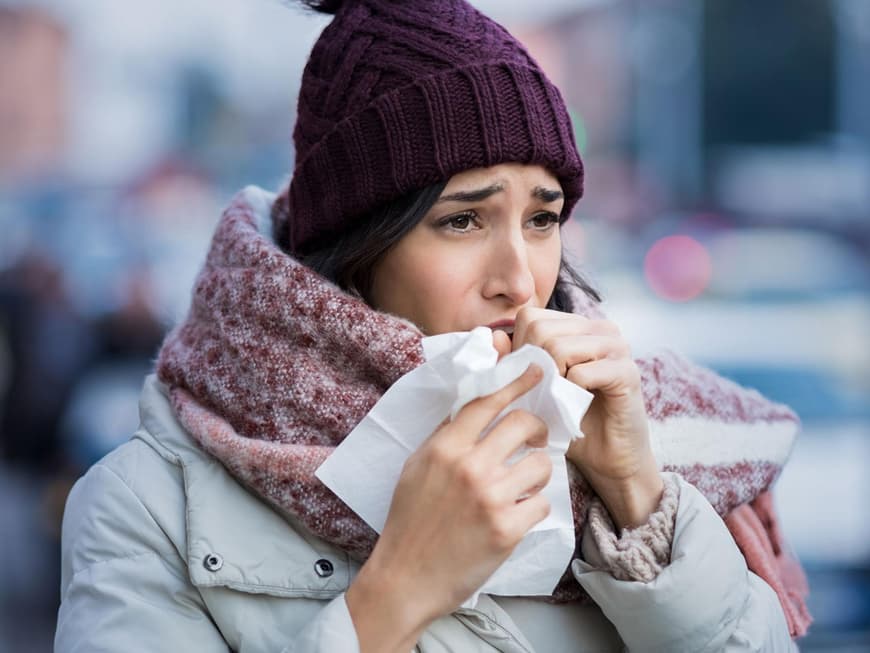
Cough sensors are still active for a long time
Hardly a cold goes by without a loud bark. When viruses infect the mucous membranes of the respiratory tract, it usually starts with a scratchy throat, then the nose closes up and the cough is not long in coming. Its job is to clear the mucus and the pathogens it contains from the airways. If it disappears along with the cold, no problem! However, if we are still coughing weeks after a cold, this usually indicates tiny inflammations that are still smouldering in our airways. The throat then continues to scratch and feels dry. This activates the cough sensors in the airways. However, as there is no more mucus to clear away, the cough becomes dry and therefore all the more painful. Doctors refer to this as a chesty cough. A constant clearing of the throat is also typical, triggered by the dry, sensitive mucous membranes.
Drinking plenty of fluids soothes the airways
To moisturize the mucous membranes, we should drink a lot - preferably herbal or fruit teas, still water and a glass of hot milk with honey just before going to bed. This home remedy ensures a peaceful night, as the ingredients in honey not only have an anti-inflammatory effect, but also soothe irritation. If you don't like milk or have a bad tolerance to it, you can let a tablespoon of honey slowly melt in your mouth. In addition, keep your throat and upper body warm - warmth supports healing and relaxes the respiratory muscles, which are stressed by the pressure of the cough.
Essential oils and salt water provide relief
Inhalations with salt water or eucalyptus oil have a direct effect on irritated mucous membranes. Simply dissolve a pinch of salt in hot water or add three to five drops of eucalyptus essential oil to the water. Tip: Use an inhaler with a funnel attachment for the mouth and nose (available from pharmacies) so that the healing vapors really reach the right place. Eucalyptus oil also unfolds its healing power from the inside. As a special distillate with myrtle, sweet orange and citronella oil, it has an expectorant and anti-inflammatory effect, soothes stressed mucous membranes and helps to get rid of stubborn coughs more quickly. Important: Take capsules with essential oils with a glass of water, not with a hot drink - otherwise the capsule will dissolve too quickly, the ingredients will be released too soon and you will burp the oils.
Breathing deeply relieves the lungs and bronchial tubes
In times of stressful coughs, the lungs and bronchial tubes need good ventilation. A few little tricks will deepen your breathing and improve your oxygen supply: Close your eyes and concentrate only on breathing, on raising and lowering your chest - we then breathe deeper and more intensively quite automatically. Or stretch your arms out to the side, breathe in deeply through your nose, hold your breath for a moment and breathe out through your mouth.
See a doctor after two weeks at the latest
If home remedies and natural remedies do not bring any improvement after one to two weeks, you should see a family doctor or ENT specialist. This is because if the cough becomes chronic, the constant strain can lead to aching muscles in the back and chest and, in the worst case, even to vomiting or bladder weakness. The doctor will also clarify whether there are any causes behind the cough that are not initially apparent, e.g. silent reflux, an allergy or a medication that has a side effect of coughing.
Silent reflux
Coughing without end, but no cold involved? Then reflux, the backflow of stomach acid via the oesophagus into the airways, may be the cause. The acid irritates the mucous membranes and triggers the cough. If sufferers also complain of acid regurgitation, the case is quickly clear. However, the acid cough can also occur without heartburn and is then referred to as silent reflux. Treatment is the same in both cases: patients are given tablets or solutions that neutralize stomach acid or slow down its formation in the stomach. Only rarely does the sphincter muscle between the stomach and oesophagus need to be surgically strengthened.
Good teas for coughs
As cold coughs are usually caused by viruses, bacteria killers such as antibiotics are ineffective. Cough teas are gentler and more effective. Recipes: Brew 1 teaspoon each of lime and elderflower with 250 ml water. For dry coughs in particular, add 1 teaspoon of thyme to 1 cup of hot water. Rosehip tea strengthens the immune system and helps you get better faster: brew 1 teaspoon of fruit with 1 cup of water.






